The U.S. Department of the Treasury and the IRS have taken a stand against tax loopholes that have allowed large partnerships to evade paying their fair share of taxes. This plan is aimed at closing a major tax loophole known as “related party basis shifting,” which has cost the government an estimated $50 billion in tax revenue over the past decade. This practice involves businesses trading original purchase prices on assets between different legal entities in order to claim more deductions and reduce future gains.
After a year of studying the issue, the agencies have announced their intention to issue proposed regulations to address basis-shifting. They have also released a revenue ruling on related-party partnership transactions that lack “economic substance” for the parties or a “substantial business purpose.” This move is part of ongoing efforts to crack down on tax abuse among the wealthiest taxpayers, large corporations, and complex partnerships.
The Treasury and the IRS are dedicated to addressing high-end tax abuse from all angles. U.S. Secretary of the Treasury Janet Yellen stated that the proposed rules will increase tax fairness and reduce the deficit. The announcement comes at a time when pass-through business filings with assets exceeding $10 million have increased significantly, while the audit rate for these partnerships has plummeted. This has resulted in a $160 billion tax gap each year, primarily attributed to the top 1% of tax filers.
In addition to cracking down on tax loopholes, President Joe Biden’s economic advisor has emphasized the importance of maintaining IRS funding to ensure that ultra-wealthy taxpayers pay their fair share. This call for sustained IRS investment has been echoed by the White House National Economic Council advisor. Despite Republican opposition to IRS funding, it is crucial in closing the tax gap and holding wealthy taxpayers accountable for their obligations.
The fight against tax loopholes is a critical step towards achieving tax fairness and reducing the deficit. By targeting schemes like basis shifting and increasing audits on high-income taxpayers, the government is taking proactive measures to ensure that everyone pays what they owe. It is imperative to support ongoing efforts to fund the IRS and hold the ultra-wealthy accountable for their tax obligations.

